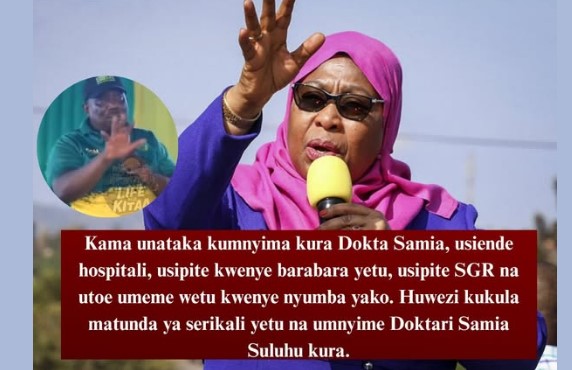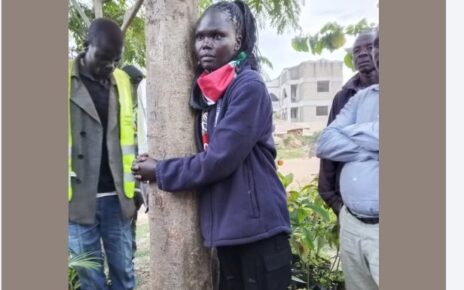A close ally of Tanzanian President Samia Suluhu Hassan has sparked heated debate after making controversial remarks that have since gone viral online. The outspoken supporter, believed to be a senior member of the ruling Chama Cha Mapinduzi (CCM), warned Tanzanians that those planning to deny President Samia their votes in the next election should refrain from using public resources such as hospitals, roads, electricity, and the Standard Gauge Railway (SGR).
In his bold statement, the ally said, “Kama unataka kumnyima kura Dokta Samia, usiende hospitali, usipite kwenye barabara yetu, usipite SGR na utoe umeme wetu kwenye nyumba yako. Huwezi kukula matunda ya serikali yetu na umnyime Doktari Samia Suluhu kura.”
(Translation: “If you want to deny Dr. Samia your vote, don’t go to our hospitals, don’t use our roads, don’t ride the SGR, and disconnect our electricity from your house. You can’t enjoy the fruits of our government and still deny Dr. Samia your vote.”)
The remarks have drawn mixed reactions from Tanzanians. Supporters of the ruling party defended the statement, saying it was meant to emphasize the government’s development efforts under President Samia’s leadership. They argue that the message was figurative — a reminder for citizens to appreciate and support the leader responsible for improving infrastructure and public services.
However, critics have condemned the remarks as divisive, undemocratic, and an attempt to intimidate voters ahead of the 2025 elections. Opposition figures and civil rights activists have expressed concern that such statements undermine democracy and the principle that public services belong to all citizens, not just supporters of the ruling party.
Political analysts have also weighed in, saying that while the remarks may have been made in excitement or loyalty, they risk alienating neutral voters and painting the ruling party as intolerant of differing opinions. They noted that Tanzania’s constitution guarantees equal access to public services for all citizens, regardless of political affiliation.
The incident comes at a time when President Samia is consolidating her political base and strengthening her image as a reformist leader. Her administration has been praised for advancing infrastructure development, promoting diplomacy, and improving Tanzania’s international image. Yet, remarks like these from her allies could complicate that narrative and create unnecessary tension in the political space.
As the 2025 general elections draw closer, Tanzanians are expected to engage in more robust political debates. The latest statement serves as a reminder of the fine line between political enthusiasm and intimidation — and the need for leaders to communicate responsibly in a democracy.
Ultimately, while the ally’s message may have been intended to inspire loyalty, it has instead sparked an important conversation about democracy, freedom of choice, and the true meaning of public service in Tanzania.



